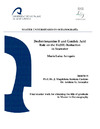Identificador persistente para citar o vincular este elemento:
https://accedacris.ulpgc.es/jspui/handle/10553/74471
| Título: | Desferrioxamine B and Gentistic Acid Role on the Fe(III) Reduction in Seawater | Autores/as: | Arreguin, Maria Luisa | Director/a : | Santana Casiano, Juana Magdalena González González, Aridane |
Clasificación UNESCO: | 251002 Oceanografía química 230331 Química del agua |
Palabras clave: | Seawater | Fecha de publicación: | 2019 | Proyectos: | Efecto de la Acidificacion Oceanica, la Temperatura y El Contenido de Materia | Resumen: | The effect of desferrioxamine B (DFB) and gentisic acid (GA) on the Fe(III) reduction was studied in seawater and NaCl solutions as a function of organic ligand concentration (100 nM – 1000 nM) and pH (7.00 – 8.01). DFB is a strong Fe-binding ligand excreted by marine microorganisms in order to keep iron in solution and make it more bioavailable for different species. On the other hand, GA is a phenolic compound excreted by marine microalgae and has been reported as a part of the ligand pool in natural waters. DFB strongly binds Fe(III) in seawater and NaCl solutions avoiding the Fe(II) regeneration. GA, however, is able to regenerate Fe(II) in a pH-dependent process that is faster in seawater than that in NaCl solutions. This reaction is affected by the major ions in seawater favoring the Fe(II) regeneration in this medium. This study showed that phenolic compounds exudated by marine organisms are influencing the Fe marine biogeochemical cycles promoting the persistence of Fe(II) in solution. Taking this into account, the Fe(III) reactions with phenolic compounds have to be considered in order to improve our understanding about the global carbon cycle. | Departamento: | Departamento de Química | Facultad: | Facultad de Ciencias del Mar | Titulación: | Máster Universitario en Oceanografía por la Universidad de Cádiz, la Universidad de Las Palmas de Gran Canaria y la Universidad de Vigo | URI: | https://accedacris.ulpgc.es/handle/10553/74471 |
| Colección: | Trabajo final de máster Restringido ULPGC |
En el caso de que no encuentre el documento puede ser debido a que el centro o las/os autoras/es no autorizan su publicación. Si tiene verdadero interés en el contenido del mismo, puede dirigirse al director/a o directores/as del trabajo cuyos datos encontrará más arriba.
Vista completaVisitas
93
actualizado el 31-oct-2024
Descargas
30
actualizado el 31-oct-2024
Google ScholarTM
Verifica
Comparte
Exporta metadatos
Los elementos en ULPGC accedaCRIS están protegidos por derechos de autor con todos los derechos reservados, a menos que se indique lo contrario.
